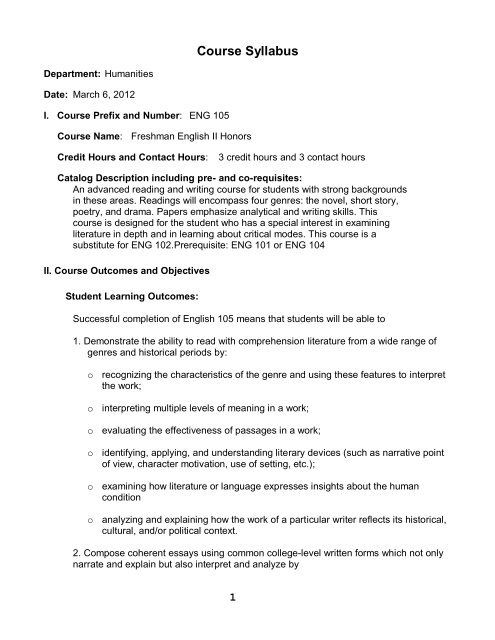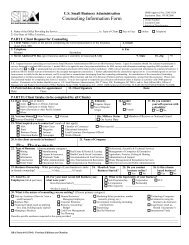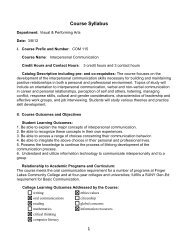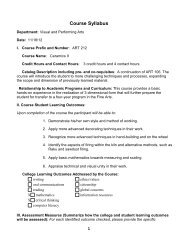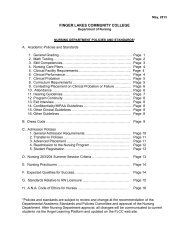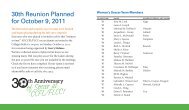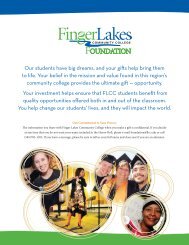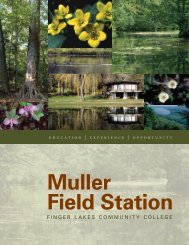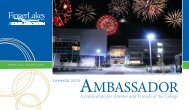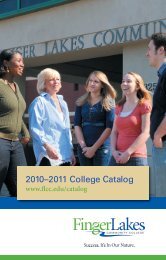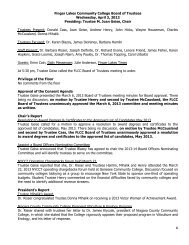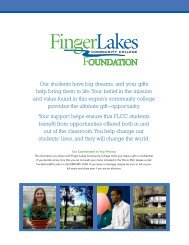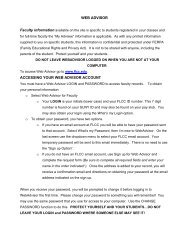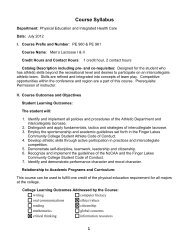Course Syllabus
Course Syllabus
Course Syllabus
You also want an ePaper? Increase the reach of your titles
YUMPU automatically turns print PDFs into web optimized ePapers that Google loves.
Department: Humanities<br />
Date: March 6, 2012<br />
I. <strong>Course</strong> Prefix and Number: ENG 105<br />
<strong>Course</strong> <strong>Syllabus</strong><br />
<strong>Course</strong> Name: Freshman English II Honors<br />
Credit Hours and Contact Hours: 3 credit hours and 3 contact hours<br />
Catalog Description including pre- and co-requisites:<br />
An advanced reading and writing course for students with strong backgrounds<br />
in these areas. Readings will encompass four genres: the novel, short story,<br />
poetry, and drama. Papers emphasize analytical and writing skills. This<br />
course is designed for the student who has a special interest in examining<br />
literature in depth and in learning about critical modes. This course is a<br />
substitute for ENG 102.Prerequisite: ENG 101 or ENG 104<br />
II. <strong>Course</strong> Outcomes and Objectives<br />
Student Learning Outcomes:<br />
Successful completion of English 105 means that students will be able to<br />
1. Demonstrate the ability to read with comprehension literature from a wide range of<br />
genres and historical periods by:<br />
o recognizing the characteristics of the genre and using these features to interpret<br />
the work;<br />
o interpreting multiple levels of meaning in a work;<br />
o evaluating the effectiveness of passages in a work;<br />
o identifying, applying, and understanding literary devices (such as narrative point<br />
of view, character motivation, use of setting, etc.);<br />
o examining how literature or language expresses insights about the human<br />
condition<br />
o analyzing and explaining how the work of a particular writer reflects its historical,<br />
cultural, and/or political context.<br />
2. Compose coherent essays using common college-level written forms which not only<br />
narrate and explain but also interpret and analyze by<br />
1
o managing the composing process (drafting, revising, and copy-editing);<br />
o revising drafts with attention to altering content and approach by reorganizing<br />
material or by clarifying and strengthening the coherence of ideas;<br />
o presenting an easily identifiable and focused controlling purpose or thesis.<br />
3. Develop well-argued interpretations of a text based on close reading that may include<br />
research with evidence drawn from carefully selected sources and documented in<br />
accepted style (the MLA) by<br />
o presenting a controlling purpose, responding to the assignment prompt with<br />
evidence drawn from carefully selected sources;<br />
o basing conclusions on thoughtful integration of the students’ own thinking and a<br />
careful analysis of outside sources.<br />
4. Demonstrate knowledge of the conventions and methods of at least one of the<br />
humanities in addition to those encompassed by other knowledge areas required by the<br />
General Education Program. (SUNY General Education Student Learning Outcome)<br />
5. Demonstrate Self-Reflective Thinking (Metacognition)<br />
• identify their strengths and weaknesses as learners<br />
• identify, their underlying values and beliefs as learners<br />
• identify their assumptions and preconceptions about learning<br />
• Identify the relative usefulness of certain habits, strategies, and learning<br />
environments to their success as learners.<br />
Relationship to Academic Programs and Curriculum:<br />
English105 is a required course for all degree programs at the college. The skills<br />
addressed in the course objectives are integral to a student’s work in numerous<br />
courses throughout the curriculum.<br />
College Learning Outcomes Addressed by the <strong>Course</strong>:<br />
x writing x computer literacy<br />
oral communication ethics/values<br />
x reading citizenship<br />
mathematics global concerns<br />
2
x critical thinking x information resources<br />
III. Instructional Materials and Methods<br />
Types of <strong>Course</strong> Materials:<br />
1. An anthology of literature, required<br />
2. A handbook for writers, recommended<br />
Methods of Instruction (e.g. Lecture, Lab, Seminar …):<br />
1. discussion<br />
2. large and small group conversation<br />
3. analytical and reader response writing assignments<br />
4. peer and instructor response to writing assignments<br />
5. library research techniques<br />
6. worksheets, critical analysis, writing strategies<br />
7. a variety of formal and informal writing assignments<br />
Honors Pedagogy<br />
Honors courses are designed to move beyond the traditional lecture format and place<br />
an emphasis on active and integrative learning.<br />
Honors courses emphasize writing as a tool for learning and reflection as well as<br />
communication.<br />
Honors courses place special emphasis on metacognition. As such, students are<br />
encouraged to directly study their own learning processes.<br />
Honors courses are not meant to require more or harder work. Rather, the work is<br />
qualitatively different and requires a high level of commitment and participation in the<br />
learning process..<br />
3
IV. Assessment Measures (Summarize how the college and student learning outcomes<br />
will be assessed):<br />
A variety of written assignments/papers (e.g. a journal, an explanatory essay, an<br />
analysis, an explication, a well-reasoned argument, and/or a researched essay,<br />
which locates, evaluates, and synthesizes information from sources, etc.) will be<br />
used to assess reading, writing, critical thinking and reasoning, computer literacy,<br />
and information resources.<br />
Presentations (e.g. creating and facilitating class discussions, oral<br />
conversations/commentaries, etc.) will be used to assess oral communication.<br />
A variety of readings and reading strategies, including recognizing the meaning<br />
of words, making inferences, recognizing the organizational structures of texts,<br />
will be used to assess the mastery of course content.<br />
Exams will be written to assess the mastery of literary devices, reading<br />
comprehension, etc.<br />
In addition, to assess the SUNY General Education Student Learning Outcome,<br />
students will be required to craft and submit an evidence-based literary argument<br />
in response to a short story. In this essay, students will be required to make and<br />
support an original claim while demonstrating a solid understanding of literary<br />
conventions.<br />
Also a final reflective essay gives students the opportunity to review all of their<br />
work throughout the semester and realize broader insights about their learning<br />
experience. Students are encouraged to mine and refer to their reflective<br />
freewrites as well as work they did in and outside of class for evidence of this<br />
process. Ideally, students establish a central claim about themselves as learners<br />
and provide details and examples from their work to support this claim. The<br />
students’ purpose is essentially to tell the story of their semester as learners –<br />
Where did they succeed? Where were they surprised? Where did they struggle?<br />
How did they cope? What insights can they take about themselves as learners<br />
into future learning opportunities in school, the work place, and life?<br />
V. General Outline of Topics Covered:<br />
Short fiction: Reading and writing about the short story and its elements, etc.<br />
Poetry: Reading and writing about poetry, discovering its themes, etc.<br />
4
Drama: Reading and writing about drama, etc.<br />
Reflective Writing: Writing to critically reflect on various facets of learning<br />
throughout the course.<br />
5


